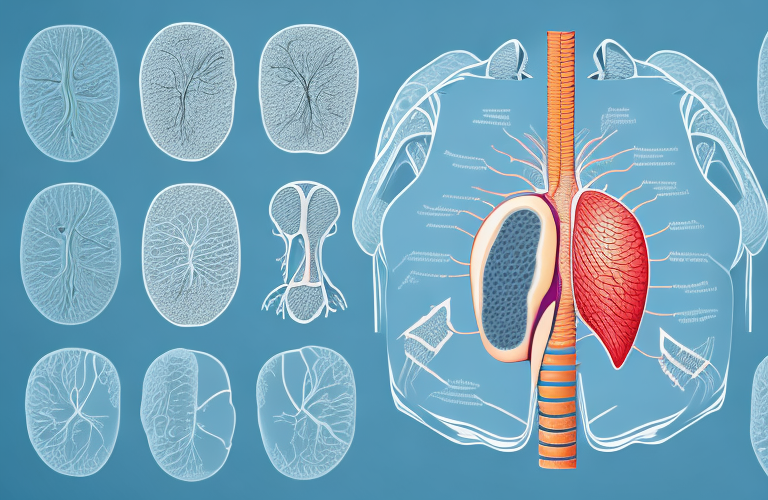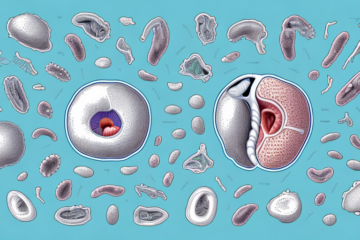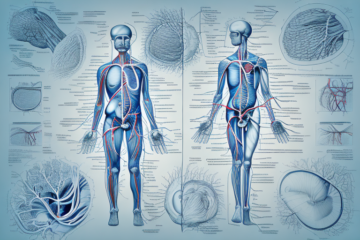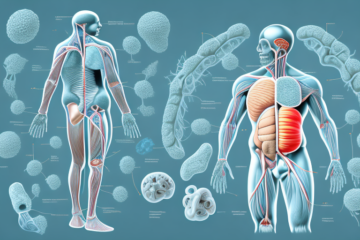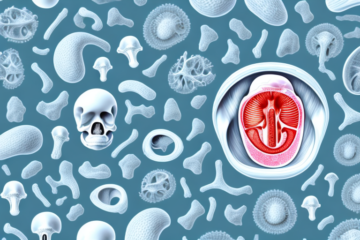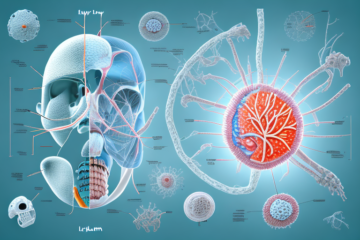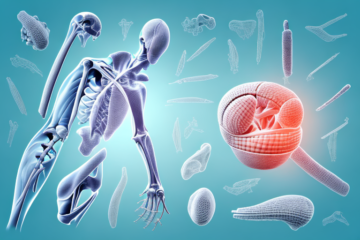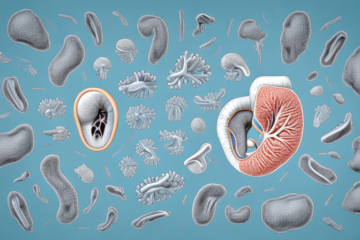The liver is one of the most important organs in the human body. It plays a major role in various bodily functions that are essential to human survival. In this article, we will be discussing the anatomy, function, and diseases associated with the liver. We will also explore various treatment options and lifestyle changes that can help maintain a healthy liver throughout your life.
What is the liver?
Before we dive into the specifics of the liver, let’s explore what this organ is and where it is located. The liver is a large, meaty organ that is situated on the right side of the abdomen, just below the diaphragm, and is protected by the ribcage. Most adults have a liver that weighs around three pounds and has a reddish-brown hue.
The liver is a vital organ that performs many essential functions in the body. It is responsible for filtering toxins and waste products from the blood, producing bile to aid in digestion, storing glucose for energy, and regulating the levels of various hormones and chemicals in the body. Without a functioning liver, the body would not be able to survive for long. It is important to take care of your liver by maintaining a healthy diet, avoiding excessive alcohol consumption, and getting regular check-ups with your healthcare provider.
The role of the liver in the body
The liver is responsible for performing a variety of vital functions, including processing nutrients derived from food, converting excess glucose into glycogen and storing this for later use, manufacturing blood-clotting factors, and breaking down toxins, such as alcohol and medication.
Additionally, the liver plays a crucial role in regulating cholesterol levels in the body. It produces bile, which helps to break down fats and absorb fat-soluble vitamins. The liver also helps to maintain a healthy immune system by producing proteins that fight off infections and diseases. Without a functioning liver, the body would struggle to perform these essential tasks, leading to a range of health problems.
Anatomy of the liver
The liver is divided into two separate lobes, the right and left lobes. Connected to the liver are various blood vessels, including the portal vein, hepatic artery, and hepatic veins. The portal vein carries blood from the digestive system to the liver, while the hepatic artery delivers oxygen-rich blood from the heart to the liver. The hepatic veins then transport the purified blood from the liver to the heart.
The liver is a vital organ that performs many functions in the body. One of its primary functions is to filter toxins and waste products from the blood. It also produces bile, which helps to digest fats and absorb fat-soluble vitamins. Additionally, the liver plays a role in regulating blood sugar levels and producing certain hormones.
Various factors can affect the health of the liver, including alcohol consumption, viral infections, and certain medications. Liver disease can range from mild to severe and can lead to serious complications if left untreated. Maintaining a healthy lifestyle, including a balanced diet and regular exercise, can help to support liver health and prevent liver disease.
How does the liver work?
The liver works by producing bile, a greenish-yellow fluid that helps digest fat. Bile is stored in the gallbladder and is released into the small intestine when needed. The liver also produces albumin and other proteins that help prevent fluid from leaking out of blood vessels into surrounding tissue.
In addition to its digestive and protein-producing functions, the liver also plays a crucial role in detoxifying the body. It filters out harmful substances, such as alcohol and drugs, and converts them into less harmful compounds that can be excreted from the body.
The liver is also responsible for storing and releasing glucose, which is a type of sugar that provides energy to the body. When blood sugar levels drop, the liver releases stored glucose into the bloodstream to maintain normal levels. This is especially important during periods of fasting or intense physical activity.
The function of the liver in digestion
The liver plays a crucial role in the digestion process. As food travels through the digestive system, the liver produces bile to help break down fats. The bile is then sent to the gallbladder, where it is stored until needed. When food reaches the small intestine, bile is released to break down the fats into smaller, more manageable pieces. This helps the body absorb nutrients from the food more efficiently.
In addition to its role in breaking down fats, the liver also helps regulate blood sugar levels. It stores excess glucose as glycogen and releases it into the bloodstream when the body needs energy. The liver also converts amino acids into glucose when the body needs it.
Furthermore, the liver plays a vital role in detoxifying the body. It filters out toxins and harmful substances from the blood, converting them into less harmful compounds that can be excreted from the body. This is why the liver is often referred to as the body’s “detox” organ.
The importance of liver enzymes and their functions
Liver enzymes are proteins that help speed up chemical reactions in the body, including the metabolism of drugs and toxins. They also help break down fats and carbohydrates into energy. Elevated levels of liver enzymes in the blood can indicate liver disease or damage.
There are several types of liver enzymes, including alanine transaminase (ALT), aspartate transaminase (AST), and alkaline phosphatase (ALP). ALT and AST are primarily found in liver cells, while ALP is found in the liver, bones, and intestines. Elevated levels of ALT and AST can indicate liver damage, while elevated levels of ALP can indicate bone or liver disease.
It is important to monitor liver enzyme levels through regular blood tests, especially for individuals who have a history of liver disease, heavy alcohol consumption, or are taking medications that can affect liver function. Maintaining a healthy lifestyle, including a balanced diet and regular exercise, can also help support liver health and prevent liver damage.
Types of liver diseases and their causes
There are several types of liver diseases that can occur, including hepatitis, cirrhosis, and liver cancer. Hepatitis is an inflammation of the liver caused by a viral infection, while cirrhosis is a condition where healthy liver tissue is replaced by scar tissue, leading to a decline in liver function. Liver cancer occurs when abnormal cells develop in the liver.
Other types of liver diseases include fatty liver disease, alcoholic liver disease, and autoimmune hepatitis. Fatty liver disease is caused by the accumulation of fat in the liver, often due to obesity or diabetes. Alcoholic liver disease is caused by excessive alcohol consumption, which can lead to inflammation and scarring of the liver. Autoimmune hepatitis is a condition where the immune system attacks the liver, leading to inflammation and damage.
Symptoms and diagnosis of liver disease
Common symptoms of liver disease include fatigue, nausea and vomiting, jaundice, and abdominal pain. Liver disease can be diagnosed through blood tests, imaging tests, or a liver biopsy.
It is important to note that liver disease can also cause changes in mental function, such as confusion and forgetfulness. In some cases, liver disease can lead to liver failure, which can be life-threatening and require a liver transplant.
If you suspect you may have liver disease, it is important to see a healthcare provider for proper diagnosis and treatment. Treatment options may include lifestyle changes, medication, or in severe cases, surgery.
Treatment options for liver disease
The treatment for liver disease depends on the underlying cause. Treatment options may include medications, lifestyle changes, or surgery in cases of severe liver damage. In some cases, a liver transplant may be required.
One of the most common causes of liver disease is alcohol abuse. In such cases, the first step in treatment is to stop drinking alcohol. This can be difficult, but support groups and counseling can help. Medications may also be prescribed to help manage withdrawal symptoms and prevent relapse.
In cases of viral hepatitis, antiviral medications may be prescribed to help fight the infection. It is important to get vaccinated against hepatitis A and B to prevent infection in the first place. Additionally, maintaining a healthy diet and exercise routine can help improve liver function and prevent further damage.
Lifestyle changes to maintain a healthy liver
Adopting a healthy lifestyle can help prevent liver disease and maintain a healthy liver. Lifestyle changes can include: reducing alcohol intake, maintaining a healthy weight, avoiding illicit drug use, and exercising regularly. A diet rich in fruits, vegetables, and whole grains can also benefit liver health.
In addition to the above mentioned lifestyle changes, it is important to avoid exposure to toxins and chemicals that can harm the liver. This includes avoiding contact with pesticides, cleaning chemicals, and other harmful substances. It is also important to take precautions when handling medications and to always follow the recommended dosage.
Another important aspect of maintaining a healthy liver is to get regular check-ups and screenings. This can help detect any potential liver problems early on, when they are easier to treat. It is recommended to get a liver function test at least once a year, especially if you have a family history of liver disease or other risk factors.
Liver health and alcohol consumption
Heavy alcohol consumption is one of the leading causes of liver disease. To maintain a healthy liver, it’s important to limit alcohol intake to no more than one drink per day for women and two drinks per day for men.
In addition to limiting alcohol intake, there are other lifestyle changes that can help improve liver health. Eating a balanced diet that is rich in fruits, vegetables, and whole grains can help reduce the risk of liver disease. Regular exercise can also help improve liver function and reduce the risk of developing liver problems.
If you have a history of heavy alcohol consumption or have been diagnosed with liver disease, it’s important to talk to your doctor about treatment options. In some cases, medication or other medical interventions may be necessary to manage liver disease and prevent further damage to the liver.
Foods that are good for your liver
Certain foods can help support a healthy liver. These foods include: green leafy vegetables, garlic, turmeric, citrus fruits, and nuts.
In addition to these foods, it is also important to limit your intake of alcohol and processed foods, as they can be harmful to your liver. Drinking plenty of water and staying hydrated can also help keep your liver functioning properly. Regular exercise and maintaining a healthy weight can also benefit your liver health.
Herbal remedies for maintaining a healthy liver
Herbal remedies, such as milk thistle and dandelion root, are believed to support liver health and may be used as a complementary treatment to traditional medical care.
It is important to note that while herbal remedies may have potential benefits for liver health, they should not be used as a substitute for medical treatment. It is always recommended to consult with a healthcare professional before incorporating any new supplements or treatments into your healthcare regimen.
How to prevent fatty liver disease
Fatty liver disease is a condition where fat accumulates in the liver, leading to inflammation and scarring of the liver tissue. To prevent fatty liver disease, it’s important to maintain a healthy weight, limit alcohol consumption, and eat a balanced diet with plenty of fruits, vegetables, and whole grains.
In addition to these lifestyle changes, regular exercise can also help prevent fatty liver disease. Exercise can help reduce body fat, which in turn reduces the amount of fat that accumulates in the liver. Aim for at least 30 minutes of moderate-intensity exercise, such as brisk walking or cycling, on most days of the week.
Understanding cirrhosis and its causes
Cirrhosis is a condition where healthy liver tissue is replaced by scar tissue, leading to a decline in liver function. Heavy alcohol consumption, hepatitis, and fatty liver disease are all common causes of cirrhosis.
Other less common causes of cirrhosis include autoimmune diseases, genetic disorders, and long-term exposure to certain toxins. Cirrhosis can also develop as a result of nonalcoholic steatohepatitis (NASH), a condition where fat builds up in the liver and causes inflammation. It is important to seek medical attention if you experience symptoms such as fatigue, jaundice, abdominal pain, or swelling in the legs or abdomen, as these may be signs of cirrhosis.
Managing cirrhosis through medication and lifestyle changes
Cirrhosis can be managed through medication and lifestyle changes, such as limiting alcohol intake and following a healthy diet. In some cases, a liver transplant may be required.
Medications can help manage the symptoms of cirrhosis, such as fatigue, itching, and swelling. Diuretics may be prescribed to reduce fluid buildup in the body, while lactulose can help prevent the buildup of toxins in the bloodstream. Antibiotics may also be prescribed to treat infections that can occur in people with cirrhosis.
In addition to medication, lifestyle changes can also play a crucial role in managing cirrhosis. Quitting smoking and avoiding exposure to secondhand smoke can help improve lung function and reduce the risk of complications. Regular exercise can also help improve overall health and reduce the risk of obesity, which can worsen cirrhosis. It is important to work closely with a healthcare provider to develop a personalized treatment plan that addresses individual needs and goals.
Liver cancer: Causes, symptoms, and treatment options
Liver cancer occurs when abnormal cells develop in the liver. Common causes of liver cancer include hepatitis, cirrhosis, and alcohol abuse. Symptoms of liver cancer may include abdominal pain, jaundice, and weight loss. Treatment options may include surgery, radiation therapy, or chemotherapy.
It is important to note that early detection of liver cancer can greatly improve the chances of successful treatment. Regular check-ups and screenings can help detect liver cancer in its early stages. Additionally, lifestyle changes such as reducing alcohol consumption and maintaining a healthy weight can help reduce the risk of developing liver cancer.
For those who have been diagnosed with liver cancer, it is important to work closely with a healthcare team to determine the best course of treatment. In some cases, a combination of treatments may be recommended. It is also important to address any underlying causes of liver cancer, such as hepatitis or cirrhosis, to prevent the cancer from recurring.
Importance of regular medical check-ups for your liver health
Regular medical check-ups, including blood tests and imaging tests, can help detect liver disease early, when it’s most treatable. It’s important to talk to your healthcare provider about your liver health and any concerns you may have.
In addition to regular medical check-ups, there are also lifestyle changes you can make to improve your liver health. These include maintaining a healthy weight, limiting alcohol consumption, avoiding exposure to toxins, and getting vaccinated against hepatitis A and B. By taking care of your liver, you can reduce your risk of developing liver disease and improve your overall health and well-being.
The future of treating liver diseases: Research and advancements
Researchers are continuously working to develop new medications and therapies to treat liver disease. Advances in medical technology have allowed for more precise and effective treatments for liver disease, and the future is looking brighter each day.
Overall, the liver plays an important role in maintaining optimal health. By adopting healthy lifestyle habits and regularly monitoring your liver health, you can prevent and manage liver disease and maintain a healthy liver for years to come.
One promising area of research for liver disease treatment is the use of stem cells. Stem cells have the ability to regenerate damaged liver tissue and potentially reverse the effects of liver disease. Clinical trials are currently underway to test the safety and effectiveness of stem cell therapy for liver disease.
In addition to medical treatments, lifestyle changes can also play a significant role in managing liver disease. Maintaining a healthy weight, avoiding alcohol and tobacco, and eating a balanced diet can all help to improve liver function and prevent further damage.

